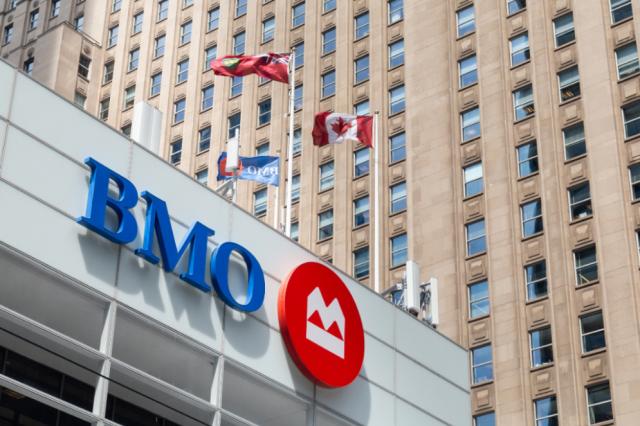
BMO also said it is creating a climate institute to find solutions to climate change. (Source: Bank of Montreal BMO Head Office Building by Cut For Good Photo / Shutterstock.com)
Bank of Montreal (BMO) said on March 10 it is targeting net-zero emissions in its lending portfolio by 2050 and will double its sustainable financing commitment to CA$300 billion (US$237 billion) by 2025, but stressed the need to avoid “abrupt” change.
The move follows similar commitments by rivals Royal Bank of Canada and Toronto-Dominion Bank.
BMO will set an intermediate target for 2030, and is also targeting a 30% reduction in greenhouse gas (GHG) emissions in its operations by 2030 from a 2019 baseline, Canada’s fourth-largest lender said in a statement.
“No doubt this transition [to a low carbon economy] will be disruptive,” BMO CEO Darryl White said in an online address. “While the failure to act is not an option, the sole answer cannot be an abrupt and disruptive change to individual industries that threaten the livelihoods of communities we serve.”
RELATED:
Wells Fargo Targets Net-zero Emissions for Financing Activities by 2050
BMO’s Global Asset Management unit will also aim to have only net-zero assets under advisement by 2050, it said. The bank also said it is creating a climate institute to find solutions to climate change.
Richard Brooks, climate finance director of advocacy group Stand.Earth, said BMO “is just following the pack” with a climate announcement that “misses the most important point: the need to end financing of the worst carbon emitters—fossil fuel companies.”
“You can’t take leadership action on climate by continuing to fund the expansion of coal and tar sands projects,” he said in a statement.
Rival Bank of Nova Scotia, in its proxy circular on March 10, committed to establishing quantitative time-bound targets for reducing GHG emissions in financing operations, and that once such targets are established, it will report progress on them. (US$1 = CA$1.2647)
Recommended Reading
Enbridge Closes First Utility Transaction with Dominion for $6.6B
2024-03-07 - Enbridge’s purchase of The East Ohio Gas Co. from Dominion is part of $14 billion in M&A the companies announced in September.
SCF Acquires Flowchem, Val-Tex and Sealweld
2024-03-04 - Flowchem, Val-Tex and Sealweld were formerly part of Entegris Inc.
Pembina Cleared to Buy Enbridge's Pipeline, NGL JV Interests for $2.2B
2024-03-19 - Pembina Pipeline received a no-action letter from the Canadian Competition Bureau, meaning that the government will not challenge the company’s acquisition of Enbridge’s interest in a joint venture with the Alliance Pipeline and Aux Sable NGL fractionation facilities.
Global Partners Buys Four Liquid Energy Terminals from Gulf Oil
2024-04-10 - Global Partners initially set out to buy five terminals from Gulf Oil but the purchase of a terminal in Portland was abandoned after antitrust concerns were raised by the FTC and the Maine attorney general.
DXP Enterprises Buys Water Service Company Kappe Associates
2024-02-06 - DXP Enterprise’s purchase of Kappe, a water and wastewater company, adds scale to DXP’s national water management profile.





